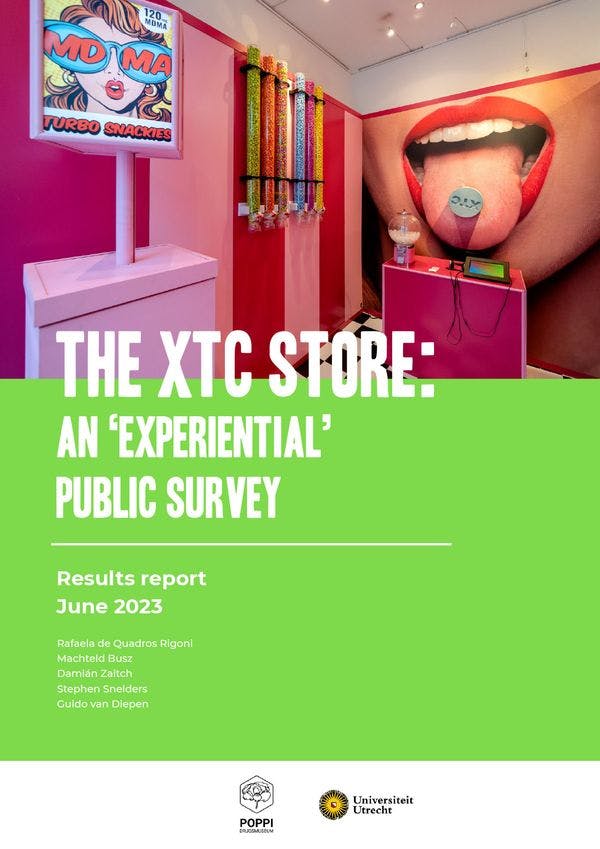La tienda XTC: Una encuesta pública "experiencial"
Rigoni et al. resumen las opiniones de personas expertas y público sobre la regulación de la MDMA recogidas en relación con una instalación pop-up (la "tienda XTC") en Utrecht (Países Bajos) destacando el apoyo a un mercado estrictamente regulado para los productos de MDMA. Más información, en inglés, está disponible abajo.
In 2022, Poppi Drug Museum and researchers from Utrecht University evaluated the societal responses to three scenarios of regulated sales of MDMA through a unique public survey: an ‘XTC store’ in the heart of Utrecht. This report describes the results of this research.
The public debate about regulating MDMA – the active substance in ecstasy1 – regularly flares up. The Netherlands is the world’s largest producer and exporter of ecstasy, and more than a million Dutch people have ever used ecstasy. The huge illegal market creates numerous social problems, from unsafe use to criminal subversion of society. However, the conversation about regulation is highly polarised, which limits thinking about alternative scenarios. In this context, drug researchers from the Poppi Museum, in collaboration with researchers from Utrecht University, have further developed three scenarios for alternative, legalised sale of MDMA: a pharmacy, a smart shop and a club/party. With the help of creatives from the Utrecht- based ‘Uitvindersgilde’ and in collaboration with Corné van der Stelt, these three points of sale were set up next to each other in a shop in the centre of Utrecht. The store was open to the public between mid-July and late September 2022.
The research linked to the XTC store had the following central question: under what conditions do visitors to the XTC store and drug experts find the regulated sale of ecstasy acceptable? The 1529 visitors to the store gave their views on the various sales conditions. In addition, the team organised two focus group discussions with politicians and policymakers, and drug policy expert academics, which were invited to the location.
The first important conclusion is that neither the visitors of the XTC store nor the participants in the focus groups understand the ‘legalisation’ or ‘regulation’ of MDMA would mean allowing the sale of MDMA unlimitedly. Both groups are in favour of (strict) sale restrictions. The experts are more conservative; most opted for a fourth scenario: a specialised but unattractive retail outlet. Most visitors to the XTC store - largely people with experience of XTC use themselves - favoured sales by the pharmacy or a smart shop. In conversation, they too often came up with a scenario between these two options, albeit with a slightly lower threshold than the experts chose. Sales at parties and clubs could still count on acceptance by around 60% of the visitors. But for all scenarios, visitors to the XTC store welcomed restrictions on sales. For example, they favoured a minimum age limit, safety guarantees and limiting the maximum doses in pills. Almost everyone was against allowing marketing and advertising.
The research had several limitations as a crossover between an ‘ experiential’ public survey and an art installation. Nevertheless, the report provides interesting indications for follow-up research and further policy explorations. The XTC store also proved very effective in creating awareness and nuanced exchange among visitors and facilitating political dialogue: on location and in the media. The conversation in the store moved beyond the polarised debate about whether or not to regulate and went into depth into possible alternative scenarios for dealing with MDMA. Doing so contributes to a deepening of the Dutch drug debate.
